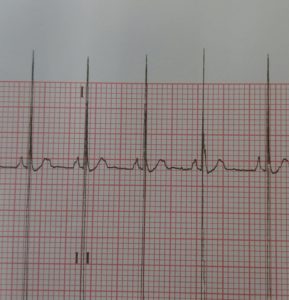 We met little Roxy during a very stressful time for her owners. She was rushed to us as she suddenly flipped on her back at home and had a fainting/seizure like episode. Roxy had been very bright and well prior to this, with her owners having no concerns, so this was completely unexpected.
We met little Roxy during a very stressful time for her owners. She was rushed to us as she suddenly flipped on her back at home and had a fainting/seizure like episode. Roxy had been very bright and well prior to this, with her owners having no concerns, so this was completely unexpected.
A thorough examination was performed on Roxy. Her temperature, mucous membranes, heart rate and respiratory rate were all within normal limits. Whilst listening to her chest, Dr Emma Crabbe discovered that Roxy had quite a severe heart murmur.
A heart murmur is an abnormal sound that can be heard when listening to the heart through a stethoscope, often described as hearing a ‘whooshing’ sound instead of a strong ‘lub dub’ sound. A heart murmur is not always a reason for concern, but common causes include heart valve problems, heart defects, tumours, or weakening of the heart muscle. Signs that your dog may have a heart condition include; difficulty breathing, sounding congested or coughing, has a pot belly, faints, or suddenly collapses. Treatments can include surgery or addressing any underlying issues that may be causing the murmur. Not all heart murmurs require treatment and we will discuss this further on the treatment plan for Roxy.
Roxy’s heart rate matched her pulse rate and her femoral pulses were within normal limits, which showed to us that her cardiovascular system was working adequately and the blood was still managing to pump efficiently throughout her body. A full health profile blood report was run on our in-house blood analysis machine. We found from this that Roxy had a higher than normal amount of white blood cells, particularly the kind we see with infections.
Roxy was kept under close watch in our hospital, our team assessing her closely to conclude on a diagnosis. Dr Emma Crabbe was deciding between:
Syncope – a temporary loss of consciousness relating to insufficient blood flow to the brain, fainting or passing out. Occurs when blood pressure is too low and the heart does not pump enough oxygen to the brain;
Seizures; or
Endocarditis – an infection of the inner lining of the heart chambers and heart valves. Can occur when bacteria, fungi or other germs from another part of the body, such as the mouth, spread through the bloodstream and attach to damaged areas of the heart. During her first initial assessment, it was noted that Roxy had dental disease.
Dr Emma was thinking syncope more than seizures in the early parts of diagnosis, due to her heart murmur but Roxy needed to be watched for further episodes. Dr Emma discussed her thoughts with Roxy’s owners at this point and recommended performing an ECG within clinic. An ECG (electrocardiogram) is a recording of the electrical activity of the heart. It is a non-invasive procedure that uses clips pl aced on the skin over the chest and legs. We have used this on Roxy to evaluate her heart rhythm and identify abnormalities (arrhythmias) in the heartbeat. The ECG findings for Roxy showed that she has a normal sinus rhythm with no arrhythmia, a good result for Roxy as this showed that the electrical conductivity through her heart (that makes it beat) was working normally.
aced on the skin over the chest and legs. We have used this on Roxy to evaluate her heart rhythm and identify abnormalities (arrhythmias) in the heartbeat. The ECG findings for Roxy showed that she has a normal sinus rhythm with no arrhythmia, a good result for Roxy as this showed that the electrical conductivity through her heart (that makes it beat) was working normally.
Roxy had no more syncope or seizure like movements whilst in our care in hospital, so it was decided that she could go home with a course of antibiotics (in case of endocarditis) for two weeks. Roxy was scheduled to have a follow up appointment with Dr Emma to assess if the heart murmur has resolved or if she needs to start on heart medications and regular monitoring. In the meantime, Roxy’s mum was happy to monitor for any warning signs at home and notify us immediately if they were concerned.
Little Roxy came back to see us for her two week recheck appointment. She was a super star and so excited to see us . She has had no further fainting episodes at home, so it seems as though her episode a few weeks ago may have been a warning sign at this stage. She has had no episodes of tiredness, coughing or increased breathing rate when sleeping, indicating that her heart murmur isn’t causing any signs of congestive heart failure. So at further appointments, Roxy will have continuing heart checks to ensure the muscle is working efficiently and Roxy’s owners will continue to monitor those signs to determine if further treatment is required.
. She has had no further fainting episodes at home, so it seems as though her episode a few weeks ago may have been a warning sign at this stage. She has had no episodes of tiredness, coughing or increased breathing rate when sleeping, indicating that her heart murmur isn’t causing any signs of congestive heart failure. So at further appointments, Roxy will have continuing heart checks to ensure the muscle is working efficiently and Roxy’s owners will continue to monitor those signs to determine if further treatment is required.






